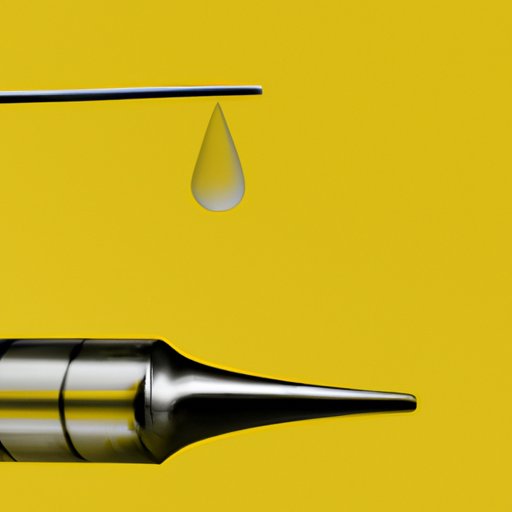Introduction
Have you ever bitten your lip or gotten a cut in your mouth and tasted the unmistakable metallic flavor of blood? Many people describe it as almost coppery or like the taste of a penny. But why does blood taste like metal? In this article, we’ll explore the science behind the metallic taste of blood and the various causes and remedies for this issue.
The Science Behind the Metallic Taste of Blood: Exploring the Chemical Composition
Blood is a complex fluid that contains many different compounds and molecules. One of these compounds is iron, which is found in the hemoglobin protein that carries oxygen throughout the body. When blood is exposed to air, the iron in hemoglobin oxidizes, which can result in a metallic taste.
In addition to iron, there are other metal ions that can be found in blood, such as copper and zinc, that can also contribute to the metallic taste. However, these metal ions are generally found in much smaller amounts than iron, which is why iron is typically the primary culprit when it comes to the metallic taste of blood.
Blood: The Metallic Taste and the Relationship with Iron Deficiency
Iron deficiency is the most common nutritional deficiency in the world, affecting an estimated 1.62 billion people globally. When the body doesn’t have enough iron, it can’t produce enough hemoglobin, which means that less oxygen is carried to the body’s tissues. Iron deficiency anemia can lead to a number of symptoms, including fatigue, weakness, and shortness of breath. One of the lesser-known symptoms of iron deficiency is a metallic taste in the mouth, which can sometimes be accompanied by dry mouth and a burning sensation on the tongue.
To treat iron deficiency anemia, it’s important to increase iron intake through diet or iron supplements. Good sources of dietary iron include lean meats, leafy green vegetables, and fortified cereals. Cooking with cast iron pans can also help increase iron intake. In severe cases of iron deficiency anemia, a doctor may recommend iron injections or an iron infusion.
How the Brain Processes the Taste of Blood and Why It’s Recognized as Metallic
When we taste something, taste receptors on our tongue send signals to our brain. The brain then processes these signals and identifies the taste. However, the taste of blood isn’t just a matter of the tongue; it’s also about the brain’s interpretation of the taste. When metal ions like iron are present in the blood, they can interact with neural signaling in a way that leads the brain to perceive the taste as metallic.
The Evolutionary Significance of a Metallic Taste in Blood: Fighting Off Diseases
It’s believed that the metallic taste of blood may have evolved as a way for the body to recognize when it’s been injured. When blood is exposed to air, it releases volatile organic compounds (VOCs) that are associated with infections and diseases. These VOCs can be detected by the body’s immune system, which can then launch a response to fight off the infection.
Exploring the Connection Between Medical Treatments and Metal-like Taste in Blood
There are several medications that can cause a metallic taste in the mouth as a side effect. One of the most common are chemotherapy drugs, which can alter taste buds and change the perception of taste. Antibiotics, blood pressure medications, and some supplements can also cause a metallic taste. It’s important to talk to your doctor if you’re experiencing a metallic taste in your mouth, especially if it’s a new symptom or if you’re taking a new medication.
To manage the side effects of these medications, it can be helpful to stay hydrated, avoid acidic or spicy foods, and use sugar-free gum or mints to freshen your breath. Some people also find that sucking on ice chips or rinsing with mouthwash can help minimize the metallic taste.
Uncovering the Myth of Blood Tasting like Copper and Revealing the Truth
While many people describe the metallic taste of blood as being similar to the taste of copper, the truth is that blood doesn’t contain enough copper to produce a coppery taste. Copper is a component of some enzymes in the body, but it’s not found in high enough concentrations in blood to be detected by taste buds.
Case Study: Understanding Metallic Taste of Blood as a Symptom in Various Medical Conditions
There are several medical conditions that can cause a metallic taste in the mouth as a symptom. Some of these conditions include diabetes, chronic kidney disease, and Parkinson’s disease. If you’re experiencing a metallic taste in your mouth along with other symptoms like nausea, vomiting, or abdominal pain, it’s important to talk to your doctor to rule out any underlying health issues.
Conclusion
The metallic taste of blood can be an unpleasant and sometimes concerning symptom, but it’s usually not a cause for alarm. Understanding the different causes of and remedies for this issue can help you manage the taste and prevent it from recurring. If you’re experiencing a metallic taste in your mouth and you’re not sure why, it’s always a good idea to talk to your doctor to rule out any underlying health issues.
